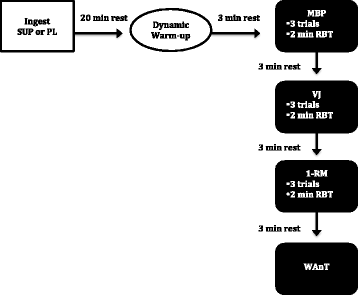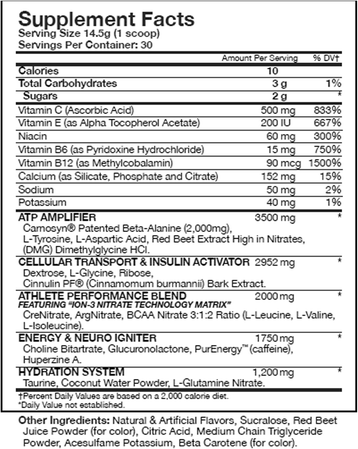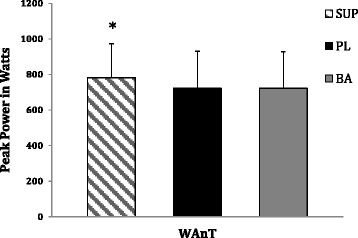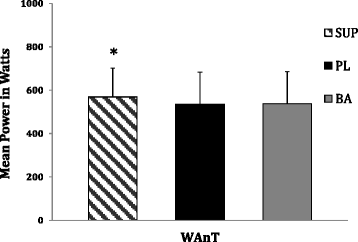The effect of acute pre-workout supplementation on power and strength performance
- PMID: 27429596
- PMCID: PMC4947244
- DOI: 10.1186/s12970-016-0138-7
The effect of acute pre-workout supplementation on power and strength performance
Abstract
Background: Consumption of pre-workout dietary supplements by both recreational and competitive athletes has increased dramatically in recent years. The purpose of this study was to determine the acute effects of a caffeine-containing pre-workout dietary supplement on various measures of performance including anaerobic power, upper and lower body power, and upper body strength in recreationally trained males.
Methods: Thirteen males (mean ± SD age = 24 ± 6 yrs; height = 180.3 ± 5 cm; body mass = 83.4 ± 9 kg) participated in this investigation in which they reported to the laboratory on four separate occasions, each separated by one week. Each subject underwent an initial familiarization session on week one followed by baseline (BA) performance testing on week two. Performance testing included a medicine ball put (MBP) to determine upper body explosive power, vertical jump test (VJ) to determine lower body explosive power, one-rep maximum bench press (1-RM) for determining upper body strength, and a Wingate Anaerobic Power Test (WAnT) to determine measures of anaerobic power. On week three, subjects were randomly assigned to ingest either a pre-workout supplement (SUP) or a placebo (PL) and again complete the performance testing protocol. Subjects were provided with the crossover treatment on the fourth and final week. Performance testing commenced 20-minute following ingestion of both treatments, which was similar to previous investigations.
Results: Significant differences in anaerobic peak power relative to the WAnT were observed following ingestion of the SUP (782 ± 191 W) in comparison to the PL (722 ± 208 W; p = 0.003; effect size = 0.30) and BA (723 ± 205 W; p = 0.011; effect size = 0.28). Significant differences were also observed for anaerobic mean power following ingestion of the SUP (569 ± 133 W) in comparison to the PL (535 ± 149 W; p = 0.006; effect size = 0.24) and BA (538 ± 148 W; p = 0.020; effect size = 0.22). No significant differences between trials were observed for upper body power, lower body power, or upper body strength.
Conclusions: Ingestion of the pre-workout dietary supplement led to significant improvements in anaerobic peak and mean power values in comparison to the placebo and baseline treatments. No improvements were observed in upper and lower body power or upper body strength. Taken prior to exercise, a caffeine-containing pre-workout dietary supplement may improve anaerobic power performance.
Keywords: Anaerobic power; Dietary supplement; Human performance; Pre-workout; Sports nutrition.
Figures




References
-
- Froiland K, Koszewski W, Hingst J, Kopecky L. Nutritional supplement use among college athletes and their sources of information. Int J Sport Nutr Exerc Metab. 2004;14(1):104–20. - PubMed
Publication types
MeSH terms
LinkOut - more resources
Full Text Sources
Other Literature Sources
Medical
Miscellaneous
